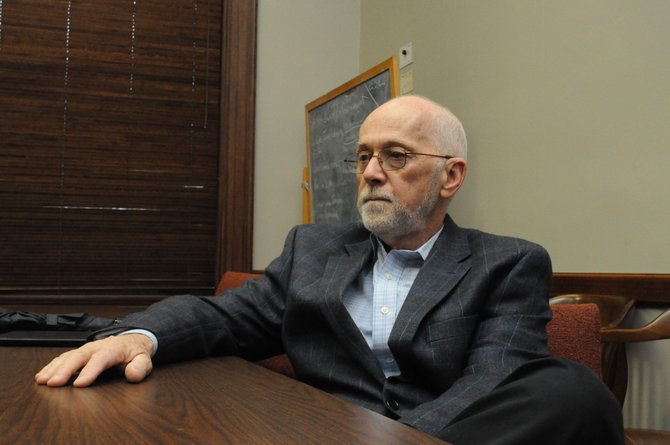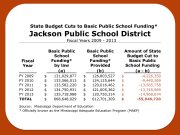The Mississippi Legislature does not lack the money to fully fund education; it lacks political will, Rep. Cecil Brown, D-Jackson, says. Photo by Trip Burns.
Take a trip to Madison Central High School, and you'll find students with decent textbooks and buildings in good repair. You'll likely see classes of fewer than 20 students. Go to a public school in Sunflower County, on the other hand, and you'll probably find textbooks in sad shape and short supply--if the kids have textbooks at all.
Rep. Cecil Brown, D-Jackson, former chairman of the House Education Committee, told the Jackson Free Press that he has met English teachers who have no books for their students and biology teachers with no lab equipment. Rep. Linda Whittington, D-Schlater, said that in Leflore County, she's seen classes with more than 30 kids. When it rains, the buckets come out to catch leaks.
On Monday, Mississippi Democrats made a case for what it really means to the state's public-school districts not to have enough money to educate their children. Then, they revealed sources of funding that could eventually make up the difference.
The House Democratic Caucus, Mississippi Legislative Black Caucus and Mississippi Democratic Trust held a public hearing on full funding of the state's public schools March 25. Because lawmakers have has not provided sufficient funding, they said, every school district has suffered, whether from inadequate numbers of teachers or higher local taxes.
The conservative argument is that the economy is slowing down and the state needs to keep money in reserve for future lean years. Republicans also say they can't or won't raise income taxes.
"You have to subscribe to the view that money is going to solve the problem in a certain area, and I don't subscribe to that view," House Speaker Philip Gunn, a Republican, told The Associated Press."
While it may not solve every problem for schools, public funding points to what a society values most, Brown said.
"The most important part of the education system is the teacher," Brown told the Jackson Free Press, adding that attracting good teachers takes money.
Mississippi paid K-12 teachers, on average, $45,896 in 2011, the National Center for Education Statistics estimates. The Atlantic magazine ranked the state sixth from the bottom in teacher pay for 2011; however, the state has one of the lowest average costs of living. Over the last several years, Mississippi has lost more than 800 teachers due to budget cuts, Brown said.
House Education Committee Chairman John Moore, R-Brandon, told the JFP Tuesday that if school districts had their priorities right, they wouldn't cut teachers, they would cut administrative costs.
Rufus Straughter, D-Belzoni, who chaired Monday's hearing, spent 25 years teaching math in the Delta. In Straughter's district, schools struggle to recruit and train teachers to deal with children raised in economically challenged households, he said.
In 1997, the Mississippi Legislature moved to level unequal educational opportunities caused by lower tax bases in some communities. The law--the Mississippi Adequate Education Program, or MAEP--provides additional funds to poorer school districts so that those children can have a shot at receiving a decent education.
"The key word in MAEP is 'adequate,'" Brown said. "It's not 'Cadillac.'" Anything less than full funding means inadequate education for many children, Brown said.
This school year, like most years since they passed it, lawmakers are proposing to short the formula. In the past 15 years, lawmakers have provided full funding only twice, in 2003 and 2007. This year, the shortfall is nearly $300 million. Cumulatively, the Legislature has shorted public schools nearly $1 billion, and all districts feel the effects.
"There are those of us who believe that public education is under attack," Straughter said at Monday's meeting.
With full funding over the last five years, Mississippi schools could have had an additional 4,814 teachers, said Rep. John Hines, D-Greenville. Mayor Connie Moran of Ocean Springs said that municipalities make up the funds through increases in car-tag fees and school and property taxes.
"There needs to be a total analysis of how school districts allocate the money and where it's being spent," Moore said, indicating that local governments need to push back on school districts that ask for too much. "School districts are receiving an ample amount of money," he said
Brown disagrees, and says that Mississippi has the money to fully fund MAEP, Right now, the state has more than $409 million in cash that is not allocated, including the rainy-day fund and capital expense funds, and revenue is up--the Legislature is adding $97 million to its 2014 budget this year (the Senate declined to raise 2013 spending by another $60 million).
Democrats also say that millions in tax credits and benefits given to businesses have not paid off. In January, Mississippi's unemployment rate was 10.7 percent, 2.2 percent higher than the national average. Two counties, Clay and Tunica, reported unemployment rates of more than 20 percent.
"The key to economic development and social development in this state, in this country, in this world, is providing the resources so that every child has an opportunity to get an adequate education," Brown said. "... Nobody's suggesting that we guarantee outcome--but everybody has to have an opportunity to achieve ... and it takes resources to do that."
Brown said that he's not asking to make up the entire shortfall in one session, but the state can work toward closing the funding gap. By adding $50 million per year to MAEP from unallocated funds, the state could ramp up to full funding in six years.
"With kids, you've got to look at it long term," he said. "That's part of the deal. Otherwise, you're going to wind up 25 years from now with another (poorly educated) adult population and say, 'Why didn't we do that?'"
For more information on what not fully funding MAEP has cost your school district, visit keeppublicschoolspublic.com. Email Ronni Mott at [email protected].



